2013103076 Research Methods: Employee Job Satisfaction and Performance
VerifiedAdded on 2019/09/30
|23
|8156
|438
Report
AI Summary
This report, prepared by a student with the ID 2013103076, examines the relationship between employee job satisfaction and job performance at CompanyZ, a semi-government organization. The research utilizes a qualitative approach, primarily employing focus groups, to analyze factors influencing job satisfaction, including pay, nature of work, promotion, co-worker relationships, and supervision. The study aims to identify the impact of these factors on employee performance and retention. The findings reveal a positive correlation between job satisfaction and performance, while also indicating low satisfaction levels among employees. The report concludes with recommendations for CompanyZ to enhance job satisfaction, thereby improving employee performance and retention, and suggests areas for future research. The research also reviews literature defining and discussing the evolution and significance of job satisfaction and performance.
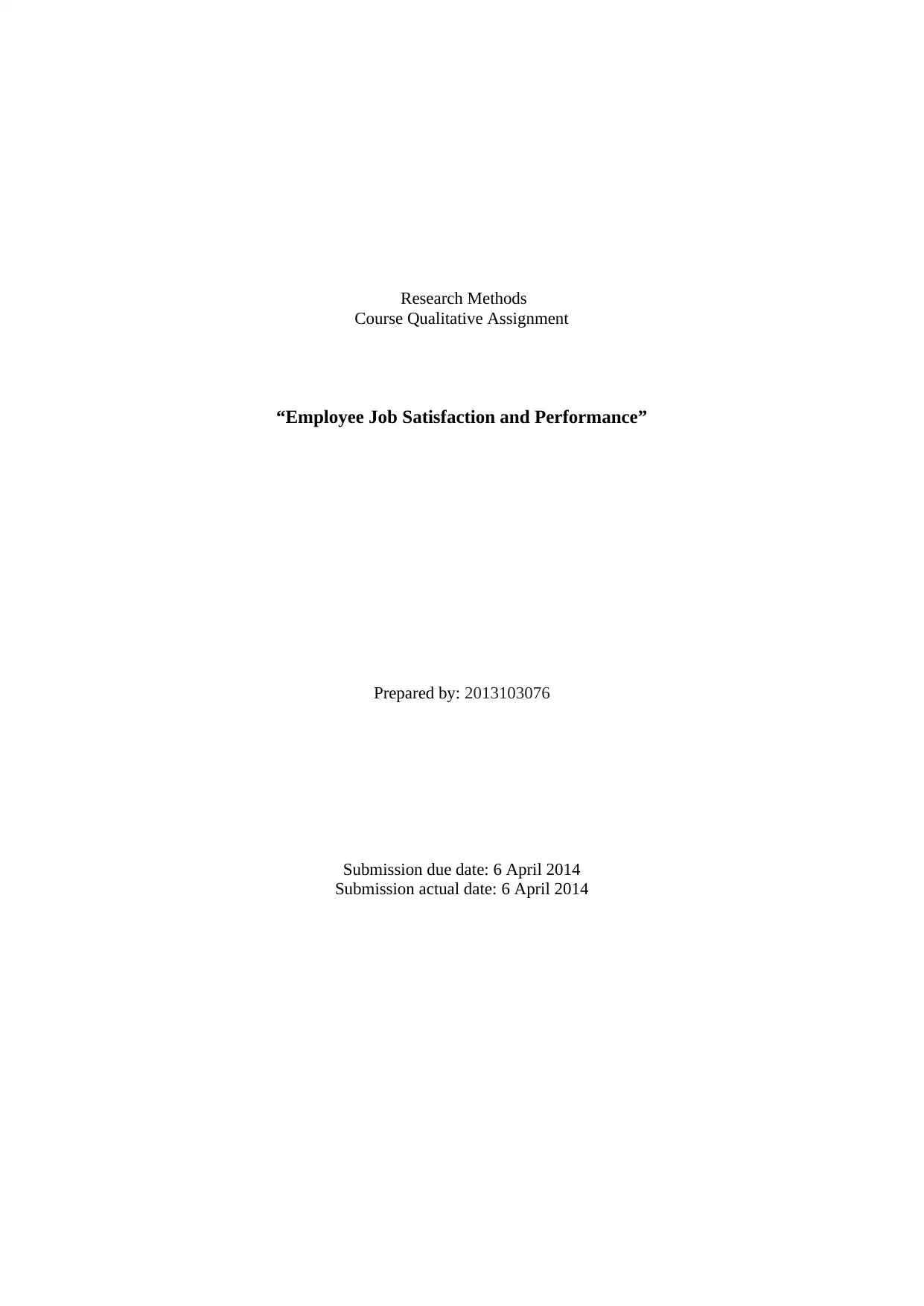
Research Methods
Course Qualitative Assignment
“Employee Job Satisfaction and Performance”
Prepared by: 2013103076
Submission due date: 6 April 2014
Submission actual date: 6 April 2014
Course Qualitative Assignment
“Employee Job Satisfaction and Performance”
Prepared by: 2013103076
Submission due date: 6 April 2014
Submission actual date: 6 April 2014
Paraphrase This Document
Need a fresh take? Get an instant paraphrase of this document with our AI Paraphraser
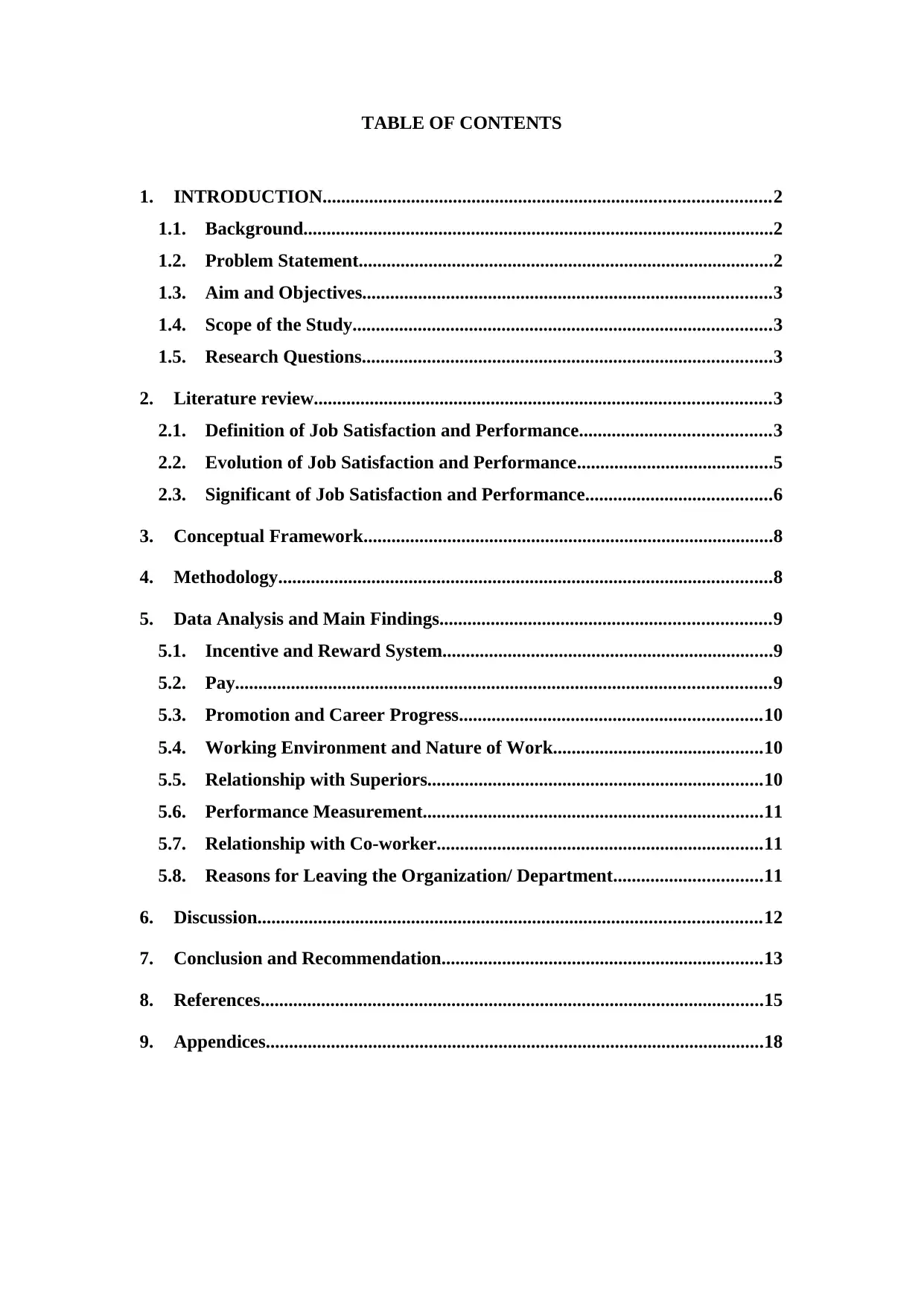
TABLE OF CONTENTS
1. INTRODUCTION................................................................................................2
1.1. Background.....................................................................................................2
1.2. Problem Statement.........................................................................................2
1.3. Aim and Objectives........................................................................................3
1.4. Scope of the Study..........................................................................................3
1.5. Research Questions........................................................................................3
2. Literature review..................................................................................................3
2.1. Definition of Job Satisfaction and Performance.........................................3
2.2. Evolution of Job Satisfaction and Performance..........................................5
2.3. Significant of Job Satisfaction and Performance........................................6
3. Conceptual Framework........................................................................................8
4. Methodology..........................................................................................................8
5. Data Analysis and Main Findings.......................................................................9
5.1. Incentive and Reward System.......................................................................9
5.2. Pay...................................................................................................................9
5.3. Promotion and Career Progress.................................................................10
5.4. Working Environment and Nature of Work.............................................10
5.5. Relationship with Superiors........................................................................10
5.6. Performance Measurement.........................................................................11
5.7. Relationship with Co-worker......................................................................11
5.8. Reasons for Leaving the Organization/ Department................................11
6. Discussion............................................................................................................12
7. Conclusion and Recommendation.....................................................................13
8. References............................................................................................................15
9. Appendices...........................................................................................................18
1. INTRODUCTION................................................................................................2
1.1. Background.....................................................................................................2
1.2. Problem Statement.........................................................................................2
1.3. Aim and Objectives........................................................................................3
1.4. Scope of the Study..........................................................................................3
1.5. Research Questions........................................................................................3
2. Literature review..................................................................................................3
2.1. Definition of Job Satisfaction and Performance.........................................3
2.2. Evolution of Job Satisfaction and Performance..........................................5
2.3. Significant of Job Satisfaction and Performance........................................6
3. Conceptual Framework........................................................................................8
4. Methodology..........................................................................................................8
5. Data Analysis and Main Findings.......................................................................9
5.1. Incentive and Reward System.......................................................................9
5.2. Pay...................................................................................................................9
5.3. Promotion and Career Progress.................................................................10
5.4. Working Environment and Nature of Work.............................................10
5.5. Relationship with Superiors........................................................................10
5.6. Performance Measurement.........................................................................11
5.7. Relationship with Co-worker......................................................................11
5.8. Reasons for Leaving the Organization/ Department................................11
6. Discussion............................................................................................................12
7. Conclusion and Recommendation.....................................................................13
8. References............................................................................................................15
9. Appendices...........................................................................................................18
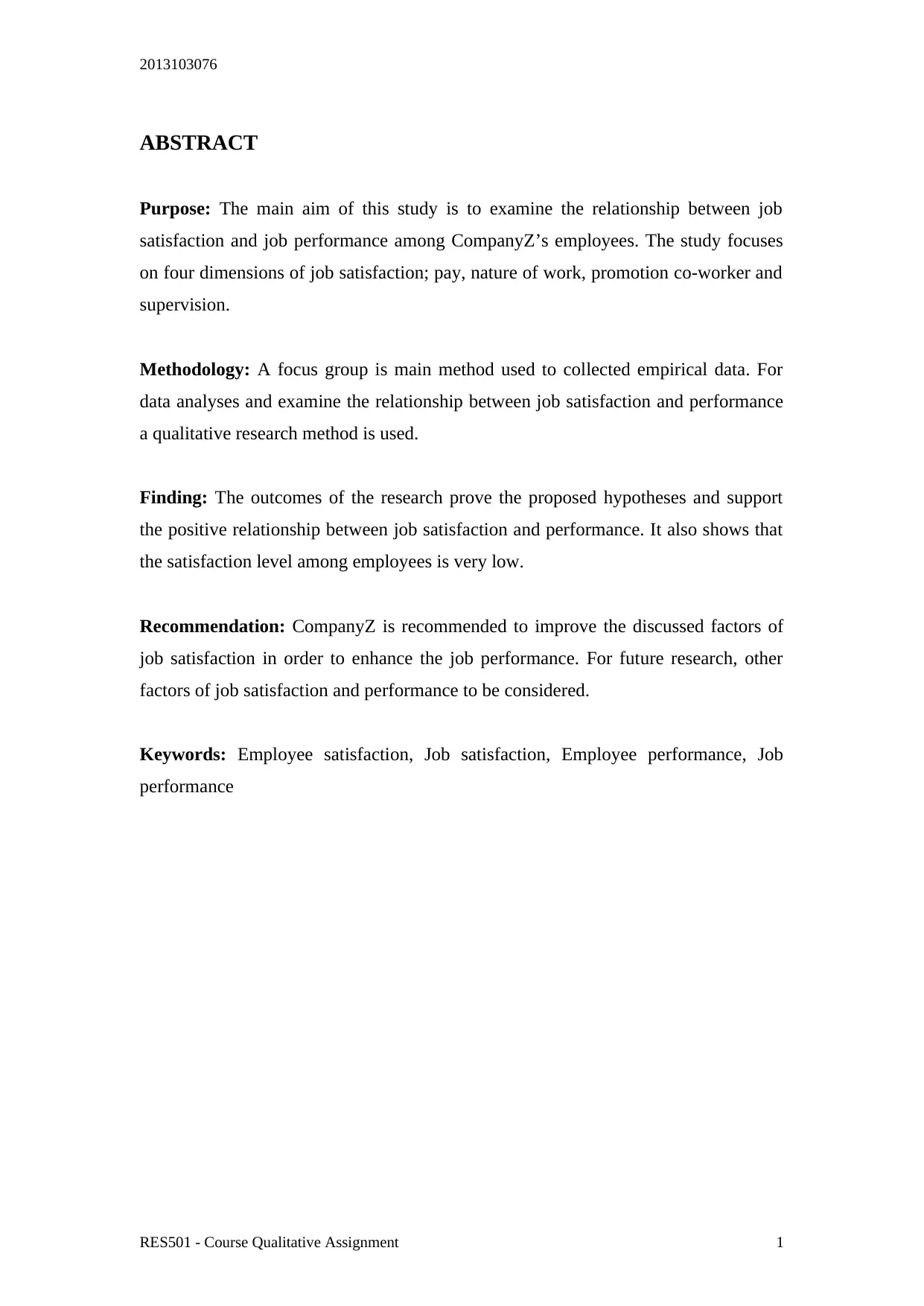
2013103076
ABSTRACT
Purpose: The main aim of this study is to examine the relationship between job
satisfaction and job performance among CompanyZ’s employees. The study focuses
on four dimensions of job satisfaction; pay, nature of work, promotion co-worker and
supervision.
Methodology: A focus group is main method used to collected empirical data. For
data analyses and examine the relationship between job satisfaction and performance
a qualitative research method is used.
Finding: The outcomes of the research prove the proposed hypotheses and support
the positive relationship between job satisfaction and performance. It also shows that
the satisfaction level among employees is very low.
Recommendation: CompanyZ is recommended to improve the discussed factors of
job satisfaction in order to enhance the job performance. For future research, other
factors of job satisfaction and performance to be considered.
Keywords: Employee satisfaction, Job satisfaction, Employee performance, Job
performance
RES501 - Course Qualitative Assignment 1
ABSTRACT
Purpose: The main aim of this study is to examine the relationship between job
satisfaction and job performance among CompanyZ’s employees. The study focuses
on four dimensions of job satisfaction; pay, nature of work, promotion co-worker and
supervision.
Methodology: A focus group is main method used to collected empirical data. For
data analyses and examine the relationship between job satisfaction and performance
a qualitative research method is used.
Finding: The outcomes of the research prove the proposed hypotheses and support
the positive relationship between job satisfaction and performance. It also shows that
the satisfaction level among employees is very low.
Recommendation: CompanyZ is recommended to improve the discussed factors of
job satisfaction in order to enhance the job performance. For future research, other
factors of job satisfaction and performance to be considered.
Keywords: Employee satisfaction, Job satisfaction, Employee performance, Job
performance
RES501 - Course Qualitative Assignment 1
⊘ This is a preview!⊘
Do you want full access?
Subscribe today to unlock all pages.

Trusted by 1+ million students worldwide
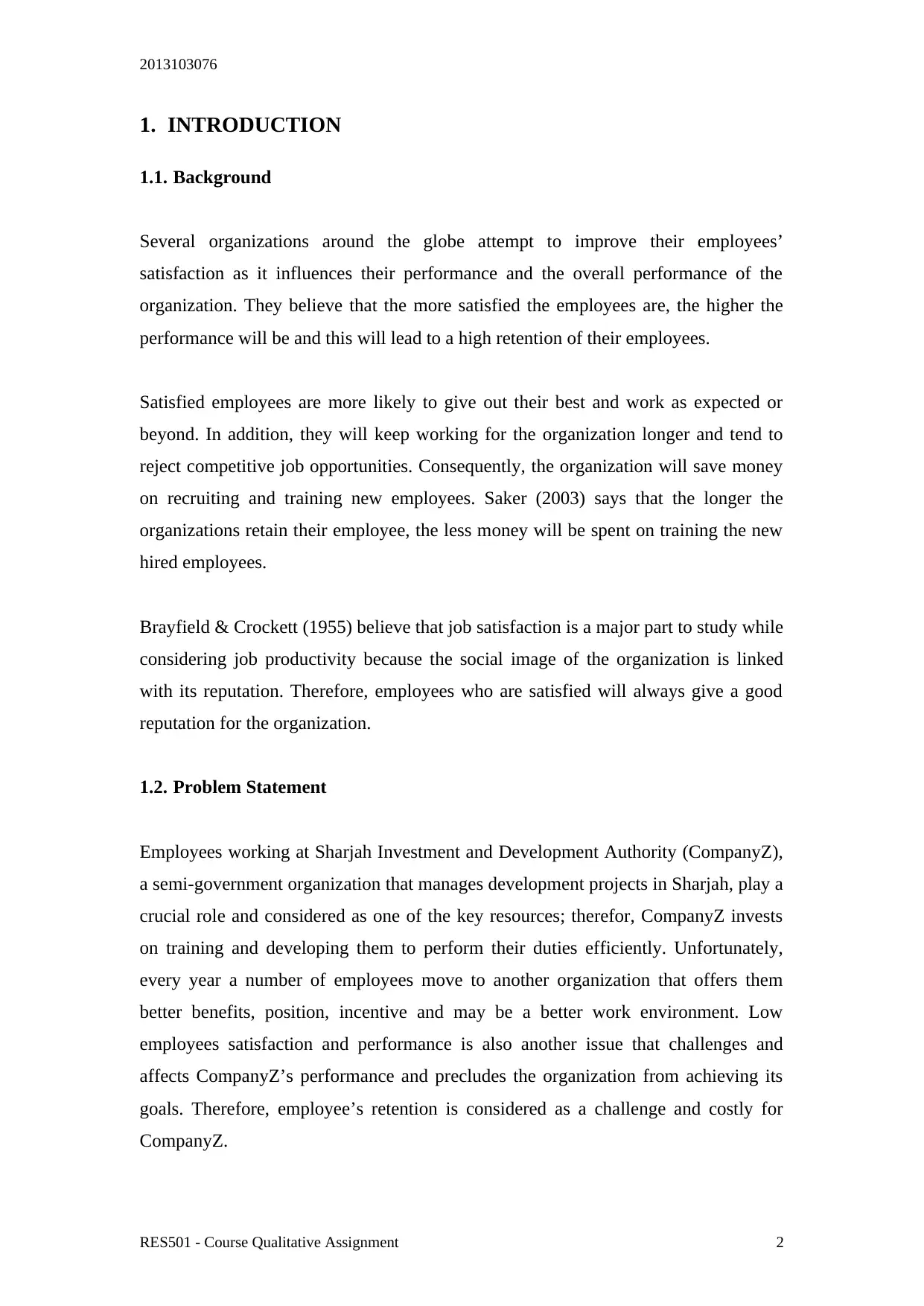
2013103076
1. INTRODUCTION
1.1. Background
Several organizations around the globe attempt to improve their employees’
satisfaction as it influences their performance and the overall performance of the
organization. They believe that the more satisfied the employees are, the higher the
performance will be and this will lead to a high retention of their employees.
Satisfied employees are more likely to give out their best and work as expected or
beyond. In addition, they will keep working for the organization longer and tend to
reject competitive job opportunities. Consequently, the organization will save money
on recruiting and training new employees. Saker (2003) says that the longer the
organizations retain their employee, the less money will be spent on training the new
hired employees.
Brayfield & Crockett (1955) believe that job satisfaction is a major part to study while
considering job productivity because the social image of the organization is linked
with its reputation. Therefore, employees who are satisfied will always give a good
reputation for the organization.
1.2. Problem Statement
Employees working at Sharjah Investment and Development Authority (CompanyZ),
a semi-government organization that manages development projects in Sharjah, play a
crucial role and considered as one of the key resources; therefor, CompanyZ invests
on training and developing them to perform their duties efficiently. Unfortunately,
every year a number of employees move to another organization that offers them
better benefits, position, incentive and may be a better work environment. Low
employees satisfaction and performance is also another issue that challenges and
affects CompanyZ’s performance and precludes the organization from achieving its
goals. Therefore, employee’s retention is considered as a challenge and costly for
CompanyZ.
RES501 - Course Qualitative Assignment 2
1. INTRODUCTION
1.1. Background
Several organizations around the globe attempt to improve their employees’
satisfaction as it influences their performance and the overall performance of the
organization. They believe that the more satisfied the employees are, the higher the
performance will be and this will lead to a high retention of their employees.
Satisfied employees are more likely to give out their best and work as expected or
beyond. In addition, they will keep working for the organization longer and tend to
reject competitive job opportunities. Consequently, the organization will save money
on recruiting and training new employees. Saker (2003) says that the longer the
organizations retain their employee, the less money will be spent on training the new
hired employees.
Brayfield & Crockett (1955) believe that job satisfaction is a major part to study while
considering job productivity because the social image of the organization is linked
with its reputation. Therefore, employees who are satisfied will always give a good
reputation for the organization.
1.2. Problem Statement
Employees working at Sharjah Investment and Development Authority (CompanyZ),
a semi-government organization that manages development projects in Sharjah, play a
crucial role and considered as one of the key resources; therefor, CompanyZ invests
on training and developing them to perform their duties efficiently. Unfortunately,
every year a number of employees move to another organization that offers them
better benefits, position, incentive and may be a better work environment. Low
employees satisfaction and performance is also another issue that challenges and
affects CompanyZ’s performance and precludes the organization from achieving its
goals. Therefore, employee’s retention is considered as a challenge and costly for
CompanyZ.
RES501 - Course Qualitative Assignment 2
Paraphrase This Document
Need a fresh take? Get an instant paraphrase of this document with our AI Paraphraser
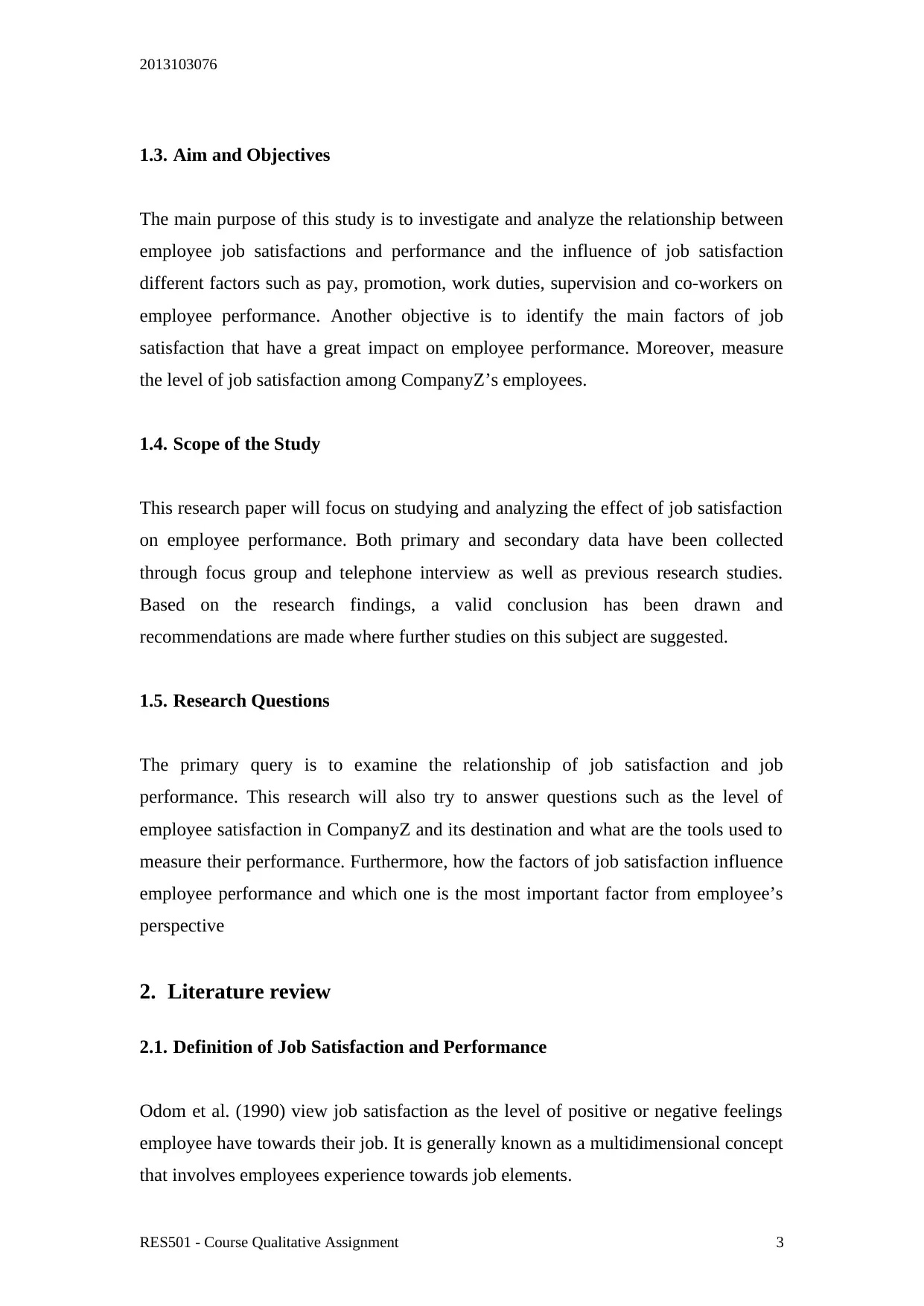
2013103076
1.3. Aim and Objectives
The main purpose of this study is to investigate and analyze the relationship between
employee job satisfactions and performance and the influence of job satisfaction
different factors such as pay, promotion, work duties, supervision and co-workers on
employee performance. Another objective is to identify the main factors of job
satisfaction that have a great impact on employee performance. Moreover, measure
the level of job satisfaction among CompanyZ’s employees.
1.4. Scope of the Study
This research paper will focus on studying and analyzing the effect of job satisfaction
on employee performance. Both primary and secondary data have been collected
through focus group and telephone interview as well as previous research studies.
Based on the research findings, a valid conclusion has been drawn and
recommendations are made where further studies on this subject are suggested.
1.5. Research Questions
The primary query is to examine the relationship of job satisfaction and job
performance. This research will also try to answer questions such as the level of
employee satisfaction in CompanyZ and its destination and what are the tools used to
measure their performance. Furthermore, how the factors of job satisfaction influence
employee performance and which one is the most important factor from employee’s
perspective
2. Literature review
2.1. Definition of Job Satisfaction and Performance
Odom et al. (1990) view job satisfaction as the level of positive or negative feelings
employee have towards their job. It is generally known as a multidimensional concept
that involves employees experience towards job elements.
RES501 - Course Qualitative Assignment 3
1.3. Aim and Objectives
The main purpose of this study is to investigate and analyze the relationship between
employee job satisfactions and performance and the influence of job satisfaction
different factors such as pay, promotion, work duties, supervision and co-workers on
employee performance. Another objective is to identify the main factors of job
satisfaction that have a great impact on employee performance. Moreover, measure
the level of job satisfaction among CompanyZ’s employees.
1.4. Scope of the Study
This research paper will focus on studying and analyzing the effect of job satisfaction
on employee performance. Both primary and secondary data have been collected
through focus group and telephone interview as well as previous research studies.
Based on the research findings, a valid conclusion has been drawn and
recommendations are made where further studies on this subject are suggested.
1.5. Research Questions
The primary query is to examine the relationship of job satisfaction and job
performance. This research will also try to answer questions such as the level of
employee satisfaction in CompanyZ and its destination and what are the tools used to
measure their performance. Furthermore, how the factors of job satisfaction influence
employee performance and which one is the most important factor from employee’s
perspective
2. Literature review
2.1. Definition of Job Satisfaction and Performance
Odom et al. (1990) view job satisfaction as the level of positive or negative feelings
employee have towards their job. It is generally known as a multidimensional concept
that involves employees experience towards job elements.
RES501 - Course Qualitative Assignment 3
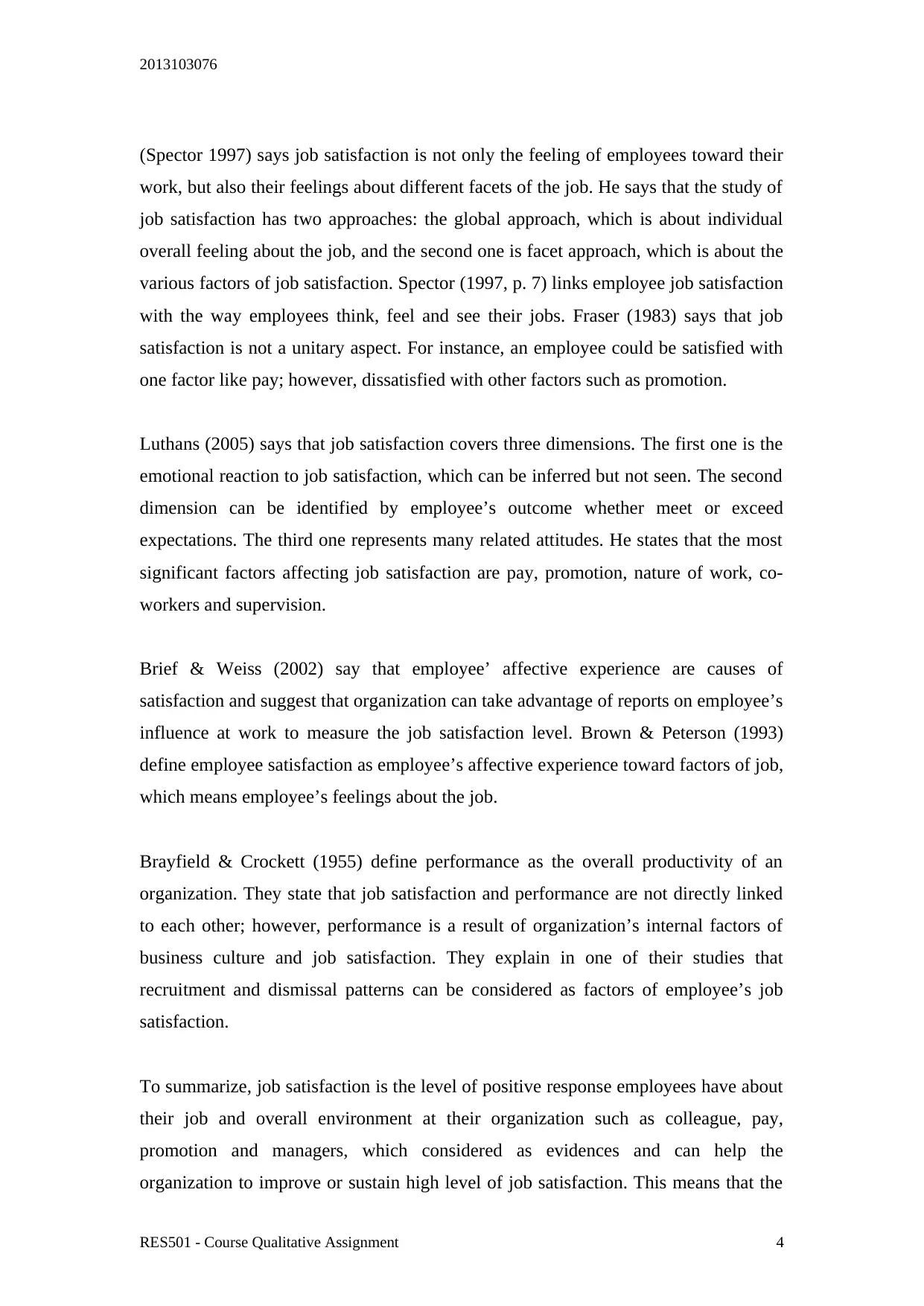
2013103076
(Spector 1997) says job satisfaction is not only the feeling of employees toward their
work, but also their feelings about different facets of the job. He says that the study of
job satisfaction has two approaches: the global approach, which is about individual
overall feeling about the job, and the second one is facet approach, which is about the
various factors of job satisfaction. Spector (1997, p. 7) links employee job satisfaction
with the way employees think, feel and see their jobs. Fraser (1983) says that job
satisfaction is not a unitary aspect. For instance, an employee could be satisfied with
one factor like pay; however, dissatisfied with other factors such as promotion.
Luthans (2005) says that job satisfaction covers three dimensions. The first one is the
emotional reaction to job satisfaction, which can be inferred but not seen. The second
dimension can be identified by employee’s outcome whether meet or exceed
expectations. The third one represents many related attitudes. He states that the most
significant factors affecting job satisfaction are pay, promotion, nature of work, co-
workers and supervision.
Brief & Weiss (2002) say that employee’ affective experience are causes of
satisfaction and suggest that organization can take advantage of reports on employee’s
influence at work to measure the job satisfaction level. Brown & Peterson (1993)
define employee satisfaction as employee’s affective experience toward factors of job,
which means employee’s feelings about the job.
Brayfield & Crockett (1955) define performance as the overall productivity of an
organization. They state that job satisfaction and performance are not directly linked
to each other; however, performance is a result of organization’s internal factors of
business culture and job satisfaction. They explain in one of their studies that
recruitment and dismissal patterns can be considered as factors of employee’s job
satisfaction.
To summarize, job satisfaction is the level of positive response employees have about
their job and overall environment at their organization such as colleague, pay,
promotion and managers, which considered as evidences and can help the
organization to improve or sustain high level of job satisfaction. This means that the
RES501 - Course Qualitative Assignment 4
(Spector 1997) says job satisfaction is not only the feeling of employees toward their
work, but also their feelings about different facets of the job. He says that the study of
job satisfaction has two approaches: the global approach, which is about individual
overall feeling about the job, and the second one is facet approach, which is about the
various factors of job satisfaction. Spector (1997, p. 7) links employee job satisfaction
with the way employees think, feel and see their jobs. Fraser (1983) says that job
satisfaction is not a unitary aspect. For instance, an employee could be satisfied with
one factor like pay; however, dissatisfied with other factors such as promotion.
Luthans (2005) says that job satisfaction covers three dimensions. The first one is the
emotional reaction to job satisfaction, which can be inferred but not seen. The second
dimension can be identified by employee’s outcome whether meet or exceed
expectations. The third one represents many related attitudes. He states that the most
significant factors affecting job satisfaction are pay, promotion, nature of work, co-
workers and supervision.
Brief & Weiss (2002) say that employee’ affective experience are causes of
satisfaction and suggest that organization can take advantage of reports on employee’s
influence at work to measure the job satisfaction level. Brown & Peterson (1993)
define employee satisfaction as employee’s affective experience toward factors of job,
which means employee’s feelings about the job.
Brayfield & Crockett (1955) define performance as the overall productivity of an
organization. They state that job satisfaction and performance are not directly linked
to each other; however, performance is a result of organization’s internal factors of
business culture and job satisfaction. They explain in one of their studies that
recruitment and dismissal patterns can be considered as factors of employee’s job
satisfaction.
To summarize, job satisfaction is the level of positive response employees have about
their job and overall environment at their organization such as colleague, pay,
promotion and managers, which considered as evidences and can help the
organization to improve or sustain high level of job satisfaction. This means that the
RES501 - Course Qualitative Assignment 4
⊘ This is a preview!⊘
Do you want full access?
Subscribe today to unlock all pages.

Trusted by 1+ million students worldwide
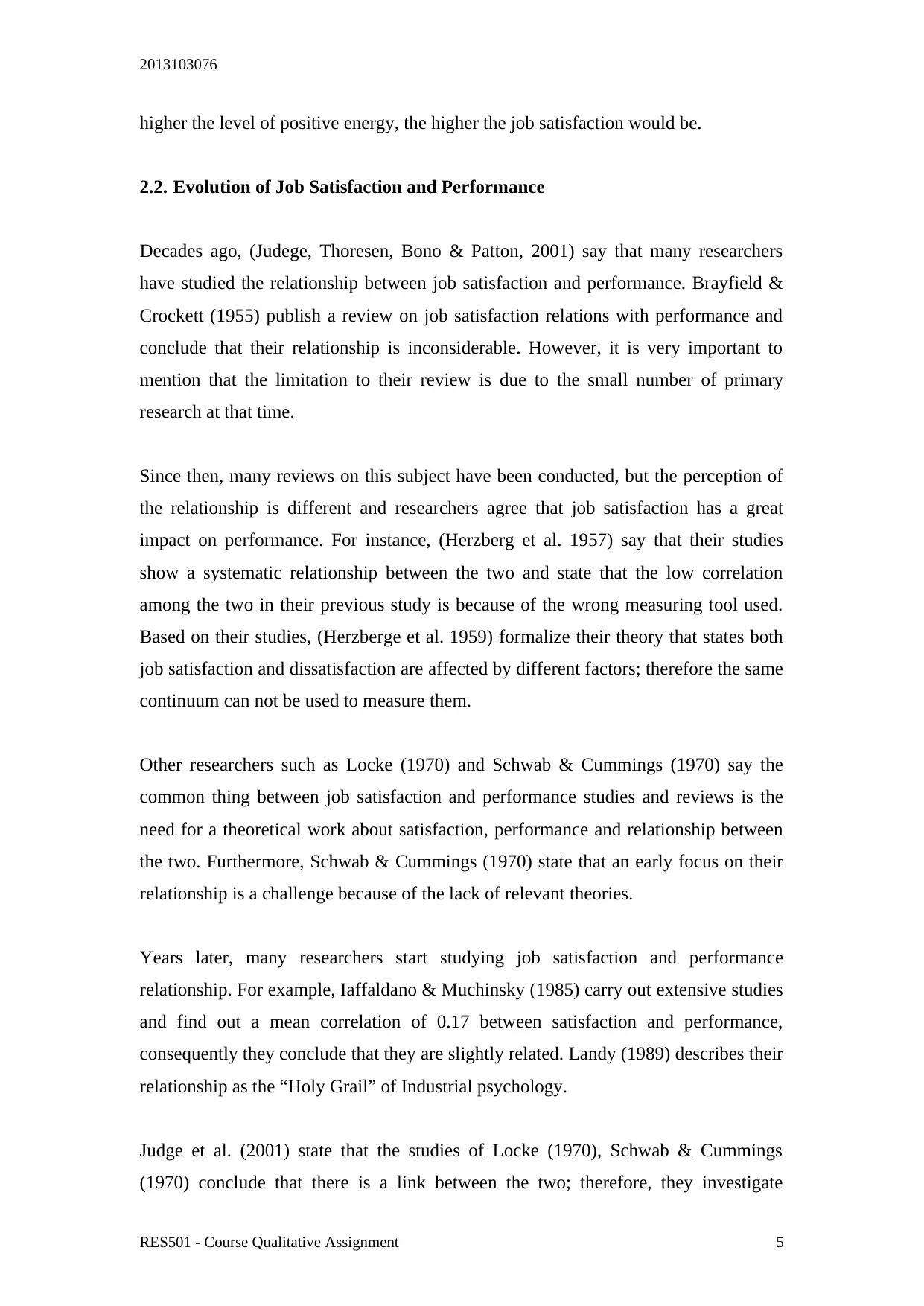
2013103076
higher the level of positive energy, the higher the job satisfaction would be.
2.2. Evolution of Job Satisfaction and Performance
Decades ago, (Judege, Thoresen, Bono & Patton, 2001) say that many researchers
have studied the relationship between job satisfaction and performance. Brayfield &
Crockett (1955) publish a review on job satisfaction relations with performance and
conclude that their relationship is inconsiderable. However, it is very important to
mention that the limitation to their review is due to the small number of primary
research at that time.
Since then, many reviews on this subject have been conducted, but the perception of
the relationship is different and researchers agree that job satisfaction has a great
impact on performance. For instance, (Herzberg et al. 1957) say that their studies
show a systematic relationship between the two and state that the low correlation
among the two in their previous study is because of the wrong measuring tool used.
Based on their studies, (Herzberge et al. 1959) formalize their theory that states both
job satisfaction and dissatisfaction are affected by different factors; therefore the same
continuum can not be used to measure them.
Other researchers such as Locke (1970) and Schwab & Cummings (1970) say the
common thing between job satisfaction and performance studies and reviews is the
need for a theoretical work about satisfaction, performance and relationship between
the two. Furthermore, Schwab & Cummings (1970) state that an early focus on their
relationship is a challenge because of the lack of relevant theories.
Years later, many researchers start studying job satisfaction and performance
relationship. For example, Iaffaldano & Muchinsky (1985) carry out extensive studies
and find out a mean correlation of 0.17 between satisfaction and performance,
consequently they conclude that they are slightly related. Landy (1989) describes their
relationship as the “Holy Grail” of Industrial psychology.
Judge et al. (2001) state that the studies of Locke (1970), Schwab & Cummings
(1970) conclude that there is a link between the two; therefore, they investigate
RES501 - Course Qualitative Assignment 5
higher the level of positive energy, the higher the job satisfaction would be.
2.2. Evolution of Job Satisfaction and Performance
Decades ago, (Judege, Thoresen, Bono & Patton, 2001) say that many researchers
have studied the relationship between job satisfaction and performance. Brayfield &
Crockett (1955) publish a review on job satisfaction relations with performance and
conclude that their relationship is inconsiderable. However, it is very important to
mention that the limitation to their review is due to the small number of primary
research at that time.
Since then, many reviews on this subject have been conducted, but the perception of
the relationship is different and researchers agree that job satisfaction has a great
impact on performance. For instance, (Herzberg et al. 1957) say that their studies
show a systematic relationship between the two and state that the low correlation
among the two in their previous study is because of the wrong measuring tool used.
Based on their studies, (Herzberge et al. 1959) formalize their theory that states both
job satisfaction and dissatisfaction are affected by different factors; therefore the same
continuum can not be used to measure them.
Other researchers such as Locke (1970) and Schwab & Cummings (1970) say the
common thing between job satisfaction and performance studies and reviews is the
need for a theoretical work about satisfaction, performance and relationship between
the two. Furthermore, Schwab & Cummings (1970) state that an early focus on their
relationship is a challenge because of the lack of relevant theories.
Years later, many researchers start studying job satisfaction and performance
relationship. For example, Iaffaldano & Muchinsky (1985) carry out extensive studies
and find out a mean correlation of 0.17 between satisfaction and performance,
consequently they conclude that they are slightly related. Landy (1989) describes their
relationship as the “Holy Grail” of Industrial psychology.
Judge et al. (2001) state that the studies of Locke (1970), Schwab & Cummings
(1970) conclude that there is a link between the two; therefore, they investigate
RES501 - Course Qualitative Assignment 5
Paraphrase This Document
Need a fresh take? Get an instant paraphrase of this document with our AI Paraphraser
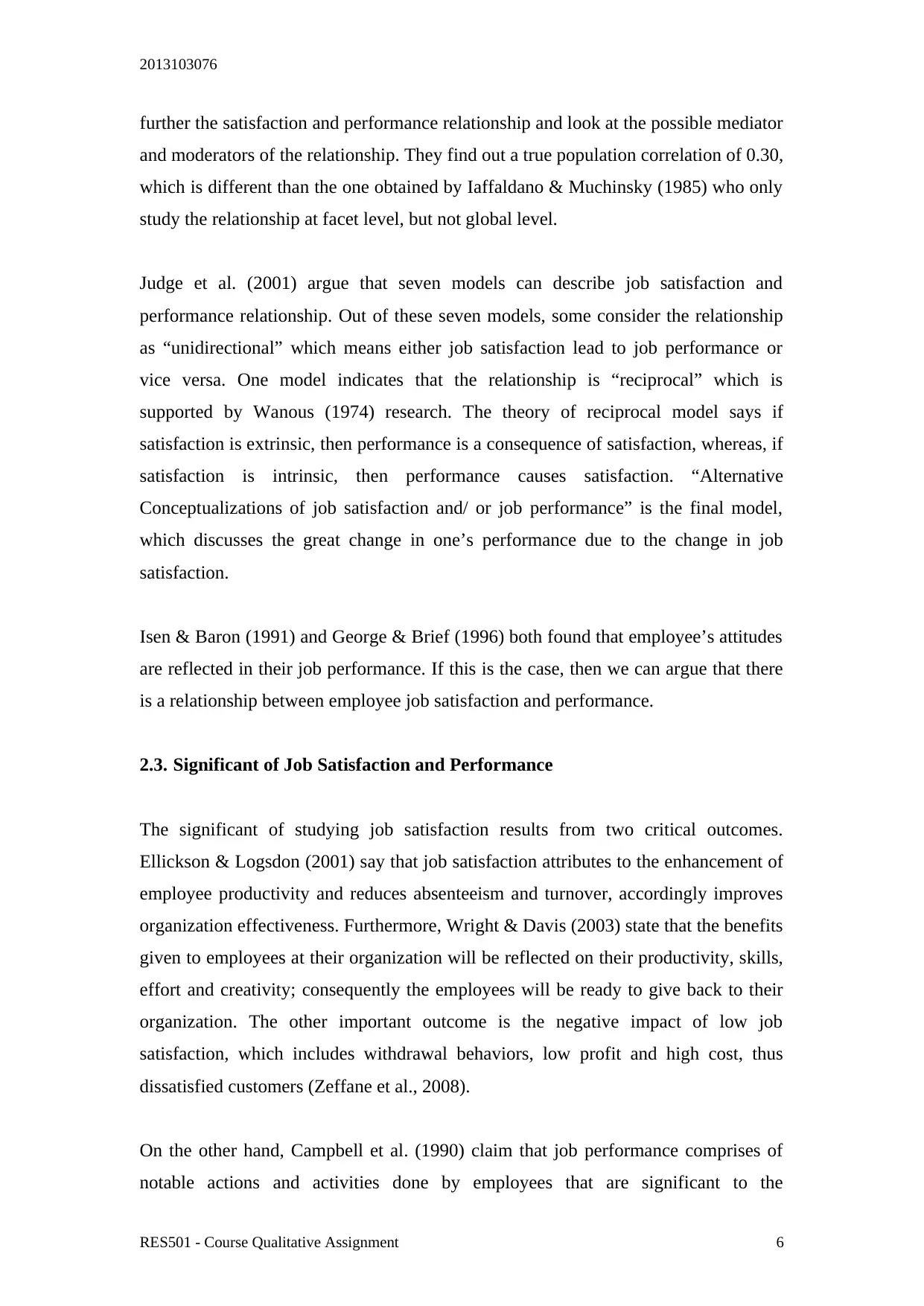
2013103076
further the satisfaction and performance relationship and look at the possible mediator
and moderators of the relationship. They find out a true population correlation of 0.30,
which is different than the one obtained by Iaffaldano & Muchinsky (1985) who only
study the relationship at facet level, but not global level.
Judge et al. (2001) argue that seven models can describe job satisfaction and
performance relationship. Out of these seven models, some consider the relationship
as “unidirectional” which means either job satisfaction lead to job performance or
vice versa. One model indicates that the relationship is “reciprocal” which is
supported by Wanous (1974) research. The theory of reciprocal model says if
satisfaction is extrinsic, then performance is a consequence of satisfaction, whereas, if
satisfaction is intrinsic, then performance causes satisfaction. “Alternative
Conceptualizations of job satisfaction and/ or job performance” is the final model,
which discusses the great change in one’s performance due to the change in job
satisfaction.
Isen & Baron (1991) and George & Brief (1996) both found that employee’s attitudes
are reflected in their job performance. If this is the case, then we can argue that there
is a relationship between employee job satisfaction and performance.
2.3. Significant of Job Satisfaction and Performance
The significant of studying job satisfaction results from two critical outcomes.
Ellickson & Logsdon (2001) say that job satisfaction attributes to the enhancement of
employee productivity and reduces absenteeism and turnover, accordingly improves
organization effectiveness. Furthermore, Wright & Davis (2003) state that the benefits
given to employees at their organization will be reflected on their productivity, skills,
effort and creativity; consequently the employees will be ready to give back to their
organization. The other important outcome is the negative impact of low job
satisfaction, which includes withdrawal behaviors, low profit and high cost, thus
dissatisfied customers (Zeffane et al., 2008).
On the other hand, Campbell et al. (1990) claim that job performance comprises of
notable actions and activities done by employees that are significant to the
RES501 - Course Qualitative Assignment 6
further the satisfaction and performance relationship and look at the possible mediator
and moderators of the relationship. They find out a true population correlation of 0.30,
which is different than the one obtained by Iaffaldano & Muchinsky (1985) who only
study the relationship at facet level, but not global level.
Judge et al. (2001) argue that seven models can describe job satisfaction and
performance relationship. Out of these seven models, some consider the relationship
as “unidirectional” which means either job satisfaction lead to job performance or
vice versa. One model indicates that the relationship is “reciprocal” which is
supported by Wanous (1974) research. The theory of reciprocal model says if
satisfaction is extrinsic, then performance is a consequence of satisfaction, whereas, if
satisfaction is intrinsic, then performance causes satisfaction. “Alternative
Conceptualizations of job satisfaction and/ or job performance” is the final model,
which discusses the great change in one’s performance due to the change in job
satisfaction.
Isen & Baron (1991) and George & Brief (1996) both found that employee’s attitudes
are reflected in their job performance. If this is the case, then we can argue that there
is a relationship between employee job satisfaction and performance.
2.3. Significant of Job Satisfaction and Performance
The significant of studying job satisfaction results from two critical outcomes.
Ellickson & Logsdon (2001) say that job satisfaction attributes to the enhancement of
employee productivity and reduces absenteeism and turnover, accordingly improves
organization effectiveness. Furthermore, Wright & Davis (2003) state that the benefits
given to employees at their organization will be reflected on their productivity, skills,
effort and creativity; consequently the employees will be ready to give back to their
organization. The other important outcome is the negative impact of low job
satisfaction, which includes withdrawal behaviors, low profit and high cost, thus
dissatisfied customers (Zeffane et al., 2008).
On the other hand, Campbell et al. (1990) claim that job performance comprises of
notable actions and activities done by employees that are significant to the
RES501 - Course Qualitative Assignment 6
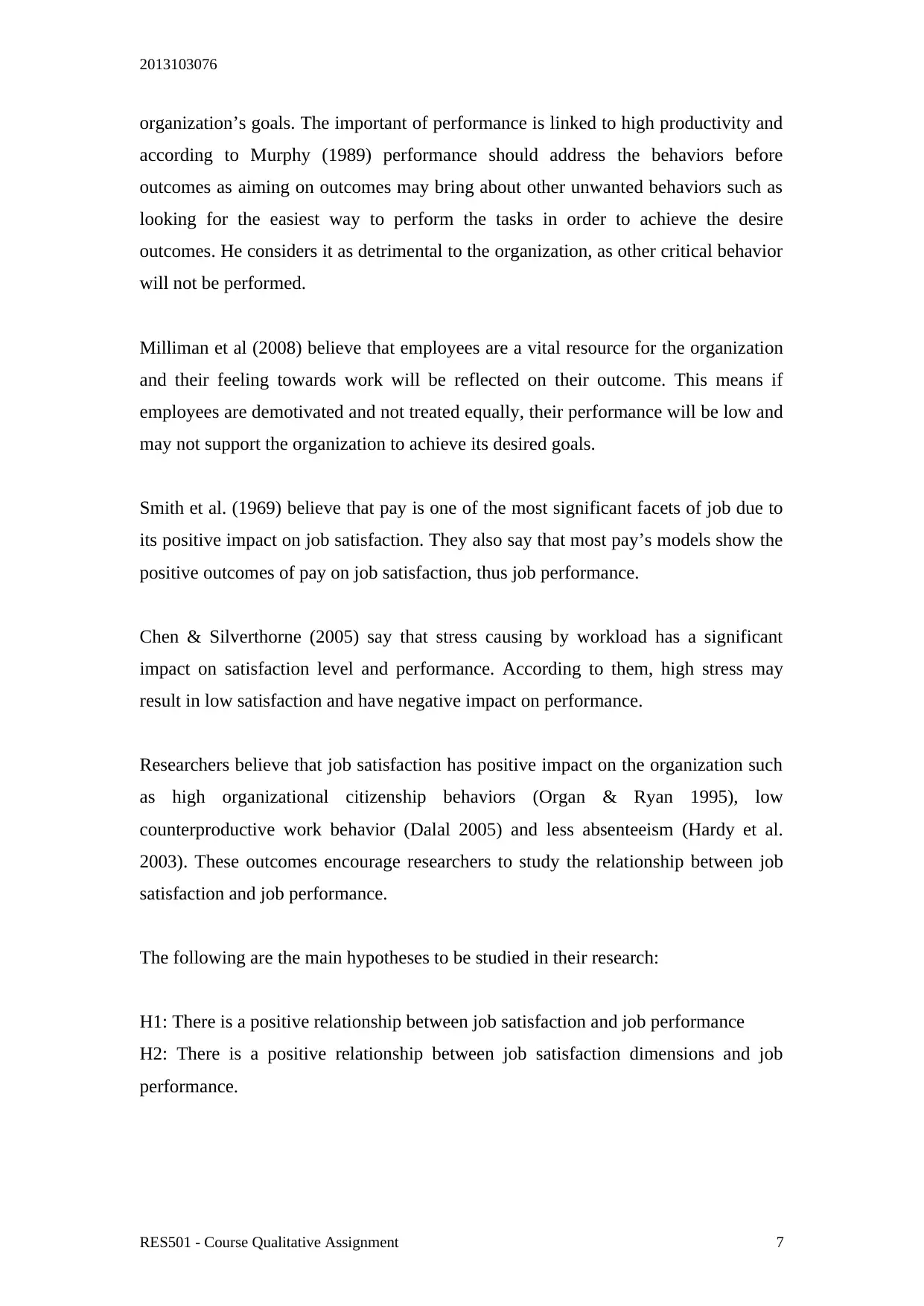
2013103076
organization’s goals. The important of performance is linked to high productivity and
according to Murphy (1989) performance should address the behaviors before
outcomes as aiming on outcomes may bring about other unwanted behaviors such as
looking for the easiest way to perform the tasks in order to achieve the desire
outcomes. He considers it as detrimental to the organization, as other critical behavior
will not be performed.
Milliman et al (2008) believe that employees are a vital resource for the organization
and their feeling towards work will be reflected on their outcome. This means if
employees are demotivated and not treated equally, their performance will be low and
may not support the organization to achieve its desired goals.
Smith et al. (1969) believe that pay is one of the most significant facets of job due to
its positive impact on job satisfaction. They also say that most pay’s models show the
positive outcomes of pay on job satisfaction, thus job performance.
Chen & Silverthorne (2005) say that stress causing by workload has a significant
impact on satisfaction level and performance. According to them, high stress may
result in low satisfaction and have negative impact on performance.
Researchers believe that job satisfaction has positive impact on the organization such
as high organizational citizenship behaviors (Organ & Ryan 1995), low
counterproductive work behavior (Dalal 2005) and less absenteeism (Hardy et al.
2003). These outcomes encourage researchers to study the relationship between job
satisfaction and job performance.
The following are the main hypotheses to be studied in their research:
H1: There is a positive relationship between job satisfaction and job performance
H2: There is a positive relationship between job satisfaction dimensions and job
performance.
RES501 - Course Qualitative Assignment 7
organization’s goals. The important of performance is linked to high productivity and
according to Murphy (1989) performance should address the behaviors before
outcomes as aiming on outcomes may bring about other unwanted behaviors such as
looking for the easiest way to perform the tasks in order to achieve the desire
outcomes. He considers it as detrimental to the organization, as other critical behavior
will not be performed.
Milliman et al (2008) believe that employees are a vital resource for the organization
and their feeling towards work will be reflected on their outcome. This means if
employees are demotivated and not treated equally, their performance will be low and
may not support the organization to achieve its desired goals.
Smith et al. (1969) believe that pay is one of the most significant facets of job due to
its positive impact on job satisfaction. They also say that most pay’s models show the
positive outcomes of pay on job satisfaction, thus job performance.
Chen & Silverthorne (2005) say that stress causing by workload has a significant
impact on satisfaction level and performance. According to them, high stress may
result in low satisfaction and have negative impact on performance.
Researchers believe that job satisfaction has positive impact on the organization such
as high organizational citizenship behaviors (Organ & Ryan 1995), low
counterproductive work behavior (Dalal 2005) and less absenteeism (Hardy et al.
2003). These outcomes encourage researchers to study the relationship between job
satisfaction and job performance.
The following are the main hypotheses to be studied in their research:
H1: There is a positive relationship between job satisfaction and job performance
H2: There is a positive relationship between job satisfaction dimensions and job
performance.
RES501 - Course Qualitative Assignment 7
⊘ This is a preview!⊘
Do you want full access?
Subscribe today to unlock all pages.

Trusted by 1+ million students worldwide
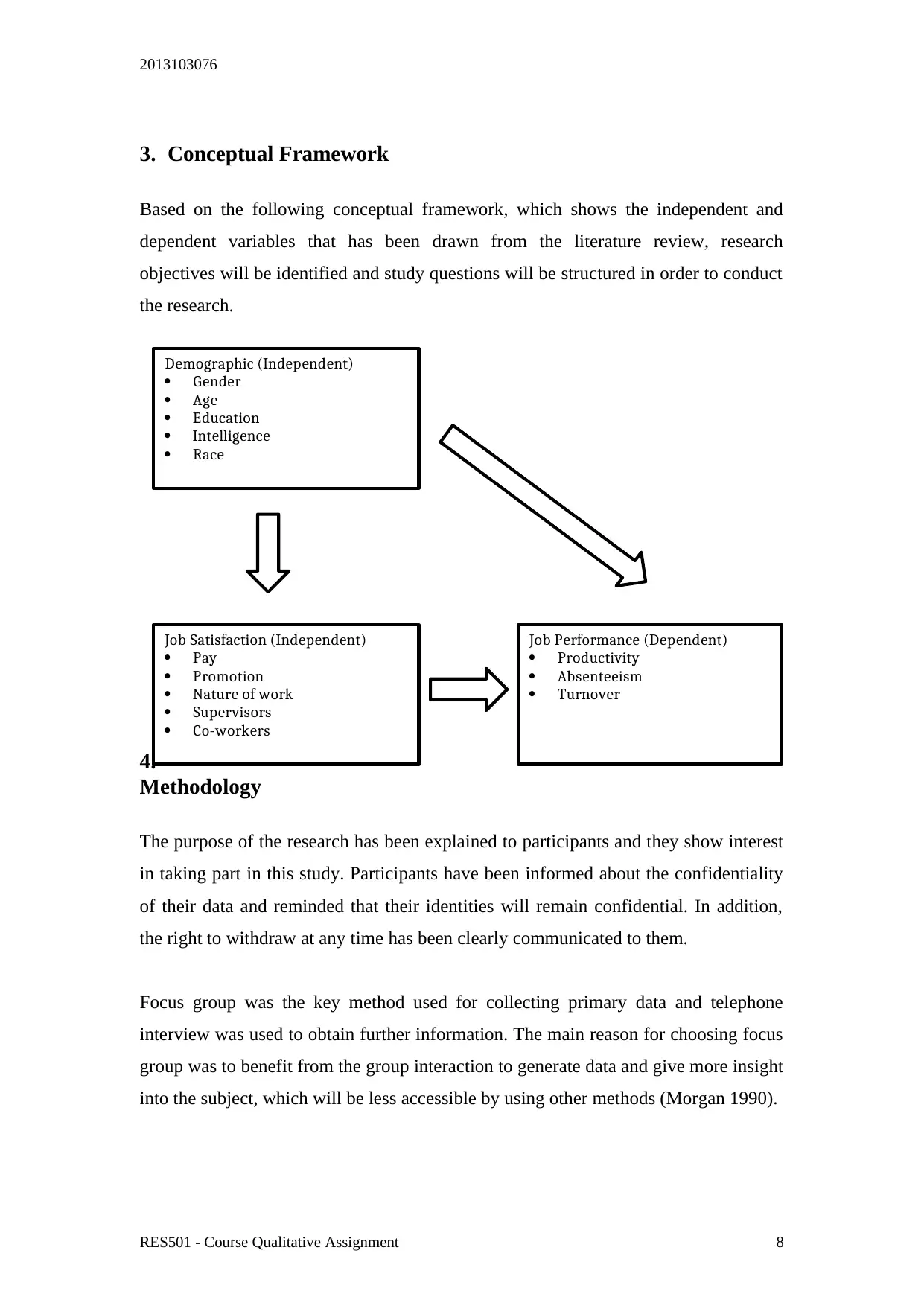
2013103076
3. Conceptual Framework
Based on the following conceptual framework, which shows the independent and
dependent variables that has been drawn from the literature review, research
objectives will be identified and study questions will be structured in order to conduct
the research.
4.
Methodology
The purpose of the research has been explained to participants and they show interest
in taking part in this study. Participants have been informed about the confidentiality
of their data and reminded that their identities will remain confidential. In addition,
the right to withdraw at any time has been clearly communicated to them.
Focus group was the key method used for collecting primary data and telephone
interview was used to obtain further information. The main reason for choosing focus
group was to benefit from the group interaction to generate data and give more insight
into the subject, which will be less accessible by using other methods (Morgan 1990).
RES501 - Course Qualitative Assignment
Demographic (Independent)
Gender
Age
Education
Intelligence
Race
Job Satisfaction (Independent)
Pay
Promotion
Nature of work
Supervisors
Co-workers
Job Performance (Dependent)
Productivity
Absenteeism
Turnover
8
3. Conceptual Framework
Based on the following conceptual framework, which shows the independent and
dependent variables that has been drawn from the literature review, research
objectives will be identified and study questions will be structured in order to conduct
the research.
4.
Methodology
The purpose of the research has been explained to participants and they show interest
in taking part in this study. Participants have been informed about the confidentiality
of their data and reminded that their identities will remain confidential. In addition,
the right to withdraw at any time has been clearly communicated to them.
Focus group was the key method used for collecting primary data and telephone
interview was used to obtain further information. The main reason for choosing focus
group was to benefit from the group interaction to generate data and give more insight
into the subject, which will be less accessible by using other methods (Morgan 1990).
RES501 - Course Qualitative Assignment
Demographic (Independent)
Gender
Age
Education
Intelligence
Race
Job Satisfaction (Independent)
Pay
Promotion
Nature of work
Supervisors
Co-workers
Job Performance (Dependent)
Productivity
Absenteeism
Turnover
8
Paraphrase This Document
Need a fresh take? Get an instant paraphrase of this document with our AI Paraphraser
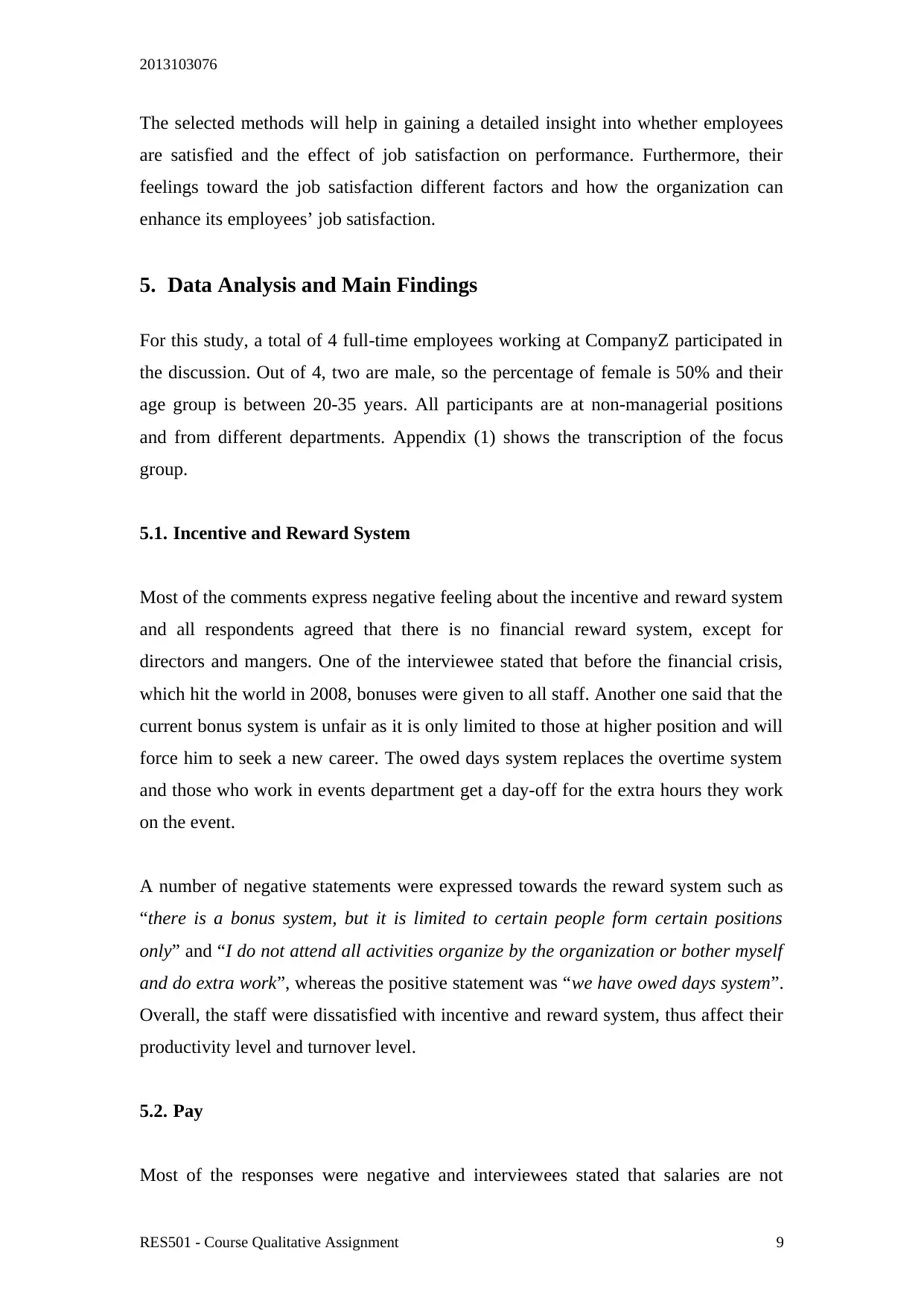
2013103076
The selected methods will help in gaining a detailed insight into whether employees
are satisfied and the effect of job satisfaction on performance. Furthermore, their
feelings toward the job satisfaction different factors and how the organization can
enhance its employees’ job satisfaction.
5. Data Analysis and Main Findings
For this study, a total of 4 full-time employees working at CompanyZ participated in
the discussion. Out of 4, two are male, so the percentage of female is 50% and their
age group is between 20-35 years. All participants are at non-managerial positions
and from different departments. Appendix (1) shows the transcription of the focus
group.
5.1. Incentive and Reward System
Most of the comments express negative feeling about the incentive and reward system
and all respondents agreed that there is no financial reward system, except for
directors and mangers. One of the interviewee stated that before the financial crisis,
which hit the world in 2008, bonuses were given to all staff. Another one said that the
current bonus system is unfair as it is only limited to those at higher position and will
force him to seek a new career. The owed days system replaces the overtime system
and those who work in events department get a day-off for the extra hours they work
on the event.
A number of negative statements were expressed towards the reward system such as
“there is a bonus system, but it is limited to certain people form certain positions
only” and “I do not attend all activities organize by the organization or bother myself
and do extra work”, whereas the positive statement was “we have owed days system”.
Overall, the staff were dissatisfied with incentive and reward system, thus affect their
productivity level and turnover level.
5.2. Pay
Most of the responses were negative and interviewees stated that salaries are not
RES501 - Course Qualitative Assignment 9
The selected methods will help in gaining a detailed insight into whether employees
are satisfied and the effect of job satisfaction on performance. Furthermore, their
feelings toward the job satisfaction different factors and how the organization can
enhance its employees’ job satisfaction.
5. Data Analysis and Main Findings
For this study, a total of 4 full-time employees working at CompanyZ participated in
the discussion. Out of 4, two are male, so the percentage of female is 50% and their
age group is between 20-35 years. All participants are at non-managerial positions
and from different departments. Appendix (1) shows the transcription of the focus
group.
5.1. Incentive and Reward System
Most of the comments express negative feeling about the incentive and reward system
and all respondents agreed that there is no financial reward system, except for
directors and mangers. One of the interviewee stated that before the financial crisis,
which hit the world in 2008, bonuses were given to all staff. Another one said that the
current bonus system is unfair as it is only limited to those at higher position and will
force him to seek a new career. The owed days system replaces the overtime system
and those who work in events department get a day-off for the extra hours they work
on the event.
A number of negative statements were expressed towards the reward system such as
“there is a bonus system, but it is limited to certain people form certain positions
only” and “I do not attend all activities organize by the organization or bother myself
and do extra work”, whereas the positive statement was “we have owed days system”.
Overall, the staff were dissatisfied with incentive and reward system, thus affect their
productivity level and turnover level.
5.2. Pay
Most of the responses were negative and interviewees stated that salaries are not
RES501 - Course Qualitative Assignment 9
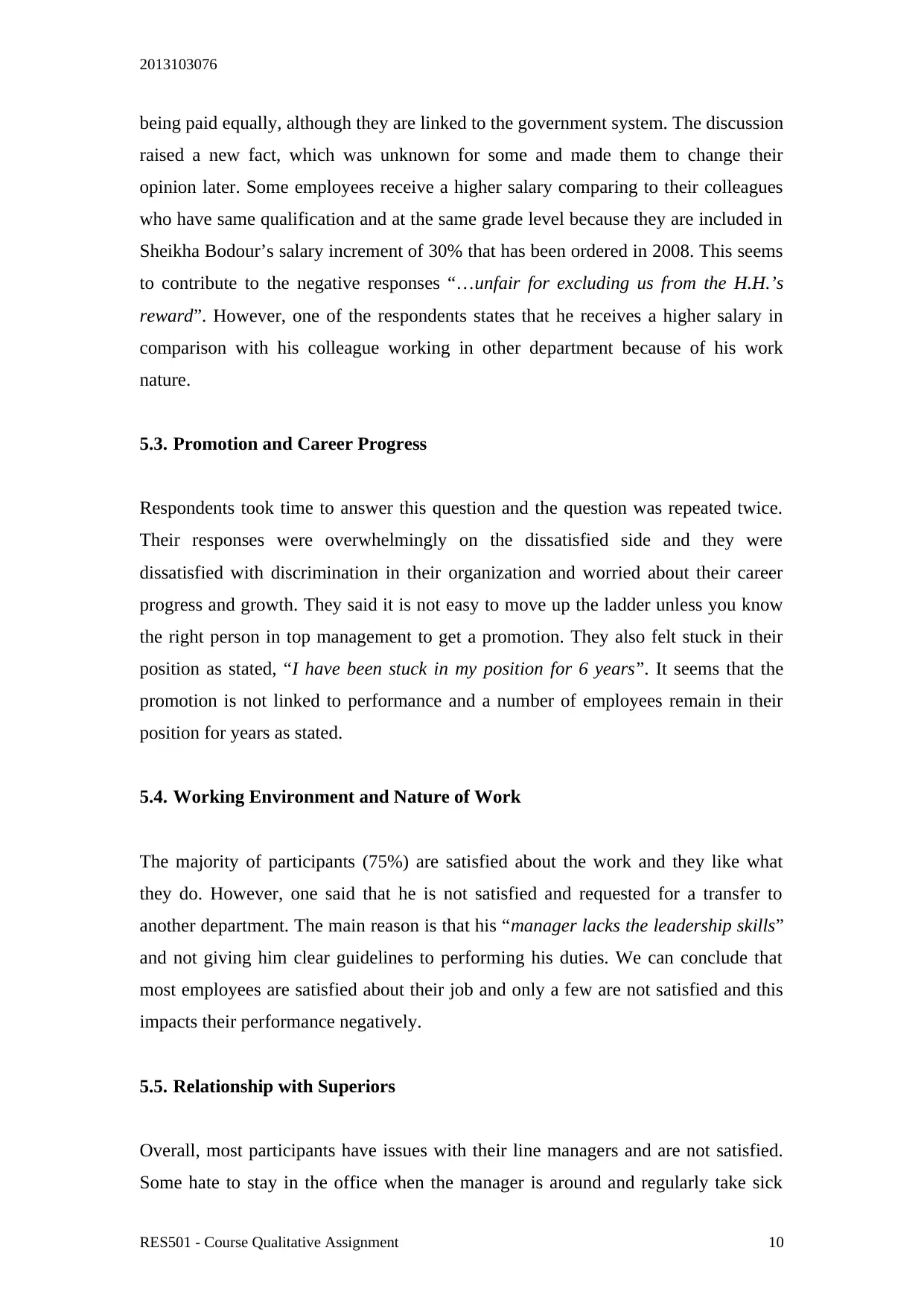
2013103076
being paid equally, although they are linked to the government system. The discussion
raised a new fact, which was unknown for some and made them to change their
opinion later. Some employees receive a higher salary comparing to their colleagues
who have same qualification and at the same grade level because they are included in
Sheikha Bodour’s salary increment of 30% that has been ordered in 2008. This seems
to contribute to the negative responses “…unfair for excluding us from the H.H.’s
reward”. However, one of the respondents states that he receives a higher salary in
comparison with his colleague working in other department because of his work
nature.
5.3. Promotion and Career Progress
Respondents took time to answer this question and the question was repeated twice.
Their responses were overwhelmingly on the dissatisfied side and they were
dissatisfied with discrimination in their organization and worried about their career
progress and growth. They said it is not easy to move up the ladder unless you know
the right person in top management to get a promotion. They also felt stuck in their
position as stated, “I have been stuck in my position for 6 years”. It seems that the
promotion is not linked to performance and a number of employees remain in their
position for years as stated.
5.4. Working Environment and Nature of Work
The majority of participants (75%) are satisfied about the work and they like what
they do. However, one said that he is not satisfied and requested for a transfer to
another department. The main reason is that his “manager lacks the leadership skills”
and not giving him clear guidelines to performing his duties. We can conclude that
most employees are satisfied about their job and only a few are not satisfied and this
impacts their performance negatively.
5.5. Relationship with Superiors
Overall, most participants have issues with their line managers and are not satisfied.
Some hate to stay in the office when the manager is around and regularly take sick
RES501 - Course Qualitative Assignment 10
being paid equally, although they are linked to the government system. The discussion
raised a new fact, which was unknown for some and made them to change their
opinion later. Some employees receive a higher salary comparing to their colleagues
who have same qualification and at the same grade level because they are included in
Sheikha Bodour’s salary increment of 30% that has been ordered in 2008. This seems
to contribute to the negative responses “…unfair for excluding us from the H.H.’s
reward”. However, one of the respondents states that he receives a higher salary in
comparison with his colleague working in other department because of his work
nature.
5.3. Promotion and Career Progress
Respondents took time to answer this question and the question was repeated twice.
Their responses were overwhelmingly on the dissatisfied side and they were
dissatisfied with discrimination in their organization and worried about their career
progress and growth. They said it is not easy to move up the ladder unless you know
the right person in top management to get a promotion. They also felt stuck in their
position as stated, “I have been stuck in my position for 6 years”. It seems that the
promotion is not linked to performance and a number of employees remain in their
position for years as stated.
5.4. Working Environment and Nature of Work
The majority of participants (75%) are satisfied about the work and they like what
they do. However, one said that he is not satisfied and requested for a transfer to
another department. The main reason is that his “manager lacks the leadership skills”
and not giving him clear guidelines to performing his duties. We can conclude that
most employees are satisfied about their job and only a few are not satisfied and this
impacts their performance negatively.
5.5. Relationship with Superiors
Overall, most participants have issues with their line managers and are not satisfied.
Some hate to stay in the office when the manager is around and regularly take sick
RES501 - Course Qualitative Assignment 10
⊘ This is a preview!⊘
Do you want full access?
Subscribe today to unlock all pages.

Trusted by 1+ million students worldwide
1 out of 23
Related Documents
Your All-in-One AI-Powered Toolkit for Academic Success.
+13062052269
info@desklib.com
Available 24*7 on WhatsApp / Email
![[object Object]](/_next/static/media/star-bottom.7253800d.svg)
Unlock your academic potential
Copyright © 2020–2026 A2Z Services. All Rights Reserved. Developed and managed by ZUCOL.





